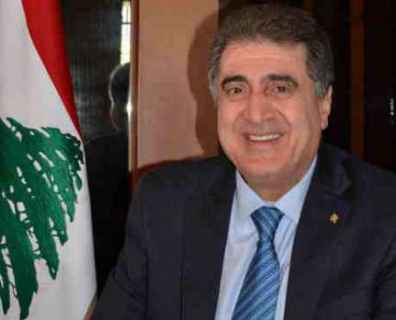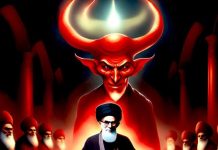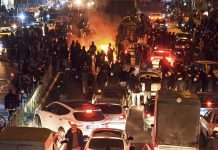Former Lebanese Diplomat Dr. Hisham Hamdan,: Iran And Its Agents In Lebanon Should Be Sued For The Damage Caused To The Country By The War Against Israel
MEMRI/December 30/2024
Iran, Lebanon | Special Dispatch No. 11749
A few days after the ceasefire between Hizbullah and Israel came into effect following over a year of fighting, and after the extent of the destruction in Lebanon became clear, with reconstruction costs estimated at $15-20 billion,[1] figures in Lebanon, in the camp opposed to the Iran-led resistance axis, began calling for Iran to compensate Lebanon for the damages of the war. According to these figures, it was Iran – not the state of Lebanon – that decided to start the war with Israel through its proxy militia, Hizbullah, and therefore it should be the one to bear the cost. If Iran refuses these demands, they said, Lebanon or Lebanese citizens should sue it in international courts, or else deduct the cost of the war from Iranian assets frozen in the West.[2]
Among the figures urging this course of action was Dr. Hisham Hamdan, a former Lebanese diplomat known for his opposition to the resistance axis, who placed the responsibility for the destruction in Lebanon on Iran and its proxy, Hizbullah. In an article published in the Lebanese daily Al-Nahar, he argued that the state of Lebanon had honored the ceasefire agreement with Israel for decades, and that it was Syria, and later Iran, that violated it by imposing war on Lebanon by means of Hizbullah in order to serve its own interests. This, he claimed, constitutes “a crime of aggression under international law,” and it is therefore the “national duty” of the Lebanese state and its people to sue Iran in international courts. Hamdan also criticized the Lebanese politicians who have allowed Hizbullah to operate as a “state within a state” in Lebanon in the service of Iran.
The following are translated excerpts from Hamdan’s article:
Lebanon Was Never A Side In The Wars With Israel; The Wars Were Forced Upon It
“The war recently stopped and a ceasefire agreement was declared. The steps to implement this agreement are still in their early stages. Israel is still clearing the area south of the Litani of pockets of Hizbullah [fighters] and of hidden weapons and trenches [i.e., tunnels]. It has two months to complete this task. The ceasefire monitoring mechanism is not yet complete. Despite this, we hear religious and secular officials describing the ceasefire as a ‘hudna,’ [temporary lull in fighting] by which they mean that it is just a pause. We still see signs that Hizbullah refuses to acknowledge defeat and talks about going back to square one…
“Lebanon was not a side in any of the wars waged by the militias of Syria and Iran against Israel along the Lebanese border. Lebanon has no connection to the war that took place on its soil. All [these] wars were waged based on an Iranian decision and with Iranian weapons. [Therefore,] under no circumstances should Lebanon be required to bear the burden of [repairing] the damage caused by this war, nor should it be held responsible for the consequences of the damage caused by the actions of the mini-state [i.e., Hizbullah], which makes decisions regarding war and peace outside the will of the state. Neither Lebanon nor the Lebanese should be held responsible for the wars waged by these militias and for the destruction caused to Lebanon by these wars. The Iranian militia [Hizbullah] calls itself a resistance force that is fighting the Israeli occupation of Lebanon, yet the intended objectives of its actions clearly contradict the legal concept of the right to resist.
“Suing Iran and its collaborators is a national duty. Lebanon and its people are victims of external intervention in their internal affairs. In 1982, Iran, with the consent of the Syrian regime, established an armed militia in Lebanon – which is subordinate to it militarily, financially, and ideologically, [since] Iran funded it and trained its members – and turned it into an arm of its [Islamic] Revolutionary Guard [Corps]. [This proxy militia] conducts wars against other countries in the region and beyond, in Iran’s interests and according to its will. Despite the signing of the Taif Agreement in 1989,[3] the Syrian regime prevented the full restoration of sovereignty to [Lebanon]. It assassinated [Lebanese] president René Moawad,[4] and imposed a political regime that allowed the continued presence of [Syrian] weapons [in Lebanon] and kept the decisions of war and peace in [Syria’s] hands, in cooperation with Iran and the militia under its control [Hizbullah]. When the Syrian regime [finally] left Lebanon, Iran became directly responsible for the violation of its national sovereignty.”
Iran’s Intervention In Lebanon Is A Violation Of International Law
“Iran’s intervention in Lebanon is a crime of aggression under international law. Iran’s establishment of armed groups, irregular forces, or mercenary [forces] that carry out armed operations in our country – [namely] Hizbullah and its supporters – counts as aggression as defined in UN General Assembly Resolution 3314 from December 14, 1974. This resolution was adopted by international consensus and serves as the international legal basis for the definition of aggression.
“According to legal theory, this definition [of aggression, as defined by Resolution 3314] is based on three criteria, all of which apply to Iran’s intervention in Lebanon:
“The first criterion – Iran is a state.
“The second criterion – its intervention makes it clearly liable as a state. Evidence of this is that, in the 1980s, Iran used its militia in Lebanon to assist it in its war against Iraq. [The militia did so] by carrying out attacks on French and American targets in Lebanon, and targets of countries that were aiding Iraq in its war against [Iran], countries whose nationals were present in Lebanon for purposes of keeping the peace there. Iran also used these militias in its regional and international struggles, as [evident from the fact that] many countries exposed terrorist cells belonging to it on their soil, preparing for military action. The war against Israel is another [factor] that fully reflects the depth of Iran’s aggressive intervention in Lebanon, for it has turned [the country] into a battleground for its total war against Israel.
“The third criterion – this intervention has become sufficiently dangerous, for it led to direct war between the two countries [Lebanon and Israel], [a war] that threatened international peace and security, caused destruction, devastation and casualties in Lebanon and Israel, necessitated repeated interventions by the Security Council, and provoked Israeli responses under the pretext of self-defense – [all of] which led countries around the world to define [Iran] as a state sponsor of terrorism and to impose sanctions on it.”
The Lebanese Government And People Must Sue Iran In International Courts
“We demand justice for Lebanon and its people. We demand that the government sue Iran for compensation in order to repair the destruction. We refuse to pay the price of its aggression. If Iran refuses to pay compensation, the government can sue it for compensation in the International Court of Justice. In addition, the victims can sue Iran’s leaders in the International Criminal Court… The Iranians who committed the crime of aggression against Lebanon are in power and are directing Iran’s political and military activities. Hizbullah acted as an agent of Iran – by its own admission.[5]
“We do not accept the idea of [Iran’s] impunity… True, Lebanon is not a member of the Rome Statute[6] due to the objections of [Parliament] Speaker [Nabih] Berri, on well-known pretexts. However, by appointing expert lawyers, the victims can file this lawsuit in court… The Attorney General has enough evidence, as well as decisions from the Security Council, to show that the actions of the Iranian militia [i.e., Hizbullah] constitute aggression…
“The crime of the 2020 [Beirut] port [explosion] revealed the depth of the crime being committed against Lebanon and its people, under the heading of coexistence between the state [of Lebanon] and the mini-state [Hizbullah]. For Lebanon – including all its regions and facilities – has become a battleground serving the mini-state, and in return, the mini-state protects senior government officials and allows them to exploit Lebanon’s resources. The result is that Lebanon – once referred to as the ‘Switzerland of the East’ – has collapsed economically…
“The crimes against the people and the homeland have escalated without [anyone being held] accountable. The idea of impunity has prevailed in the country. This must be confronted by resorting to international law and putting an end to the avoidance of accountability and punishment.”[7]
[1] Al-Quds Al-Arabi (London), November 29, 2024.
[2] Nidaa Al-Watan (Lebanon), December 2, 2024.
[3] The Taif Agreement of October 22, 1989, was a political accord that ended the Lebanese civil war. It called for extensive political reforms and established Lebanon’s confessional system that divides the political, civil, and military powers among Lebanon’s various sects. The agreement also stipulated that all the militias in Lebanon must be disarmed and that the Syrian forces must withdraw from the country..
[4] René Moawad was president of Lebanon for 17 days, from November 5, 1989 until his assassination on November 22. Pro-Syrian forces were suspected of being responsible, but the murderers were never caught.
[5] Hizbullah’s former secretary general, Hassan Nasrallah, declared on several occasions that Iran armed and funded his organization. For example, in a 2016 speech, he said that “the budget of Hizbullah, its salaries, its expenses, its food, its drink, its weapons, and its missiles come from the Islamic Republic of Iran.” See MEMRI TV Clip No. 5544, Hassan Nasrallah: Hizbullah’s Money and Missiles Reach Us Directly from Iran, No Law Will Prevent This, June 24, 2016.
[6] The Rome Statute of the International Criminal Court (ICC) is an international treaty that includes the basic principles according to which the ICC seated at the Hague operates. It was adopted at a diplomatic conference held in Rome on July 17, 1998, and went into effect on July 1, 2002. According to the statute, the ICC has the authority to investigate crimes of genocide, crimes against humanity, war crimes, and crimes of aggression, as defined in UN General Assembly Resolution 3314, which is referred to above.
[7] Al-Nahar (Lebanon), December 7, 2024.
https://www.memri.org/reports/former-lebanese-diplomat-iran-and-its-agents-lebanon-should-be-sued-damage-caused-country



















